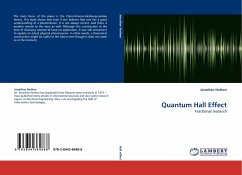The Hall effect is the production of a voltage difference (the Hall voltage ) across an electrical conductor, transverse to an electric current in the conductor and a magnetic field perpendicular to the current. Edwin Hall discovered this effect in 1879. The Hall coefficient is defined as the ratio of the induced electric field to the product of the current density and the applied magnetic field. It is a characteristic of the material from which the conductor is made, as its value depends on the type, number and properties of the charge carriers that constitute the current.
Bitte wählen Sie Ihr Anliegen aus.
Rechnungen
Retourenschein anfordern
Bestellstatus
Storno








